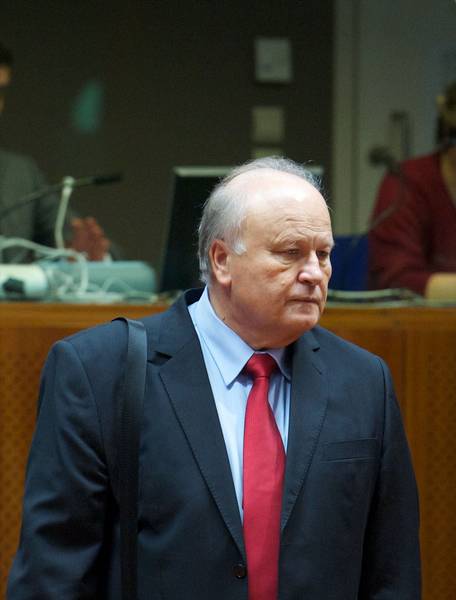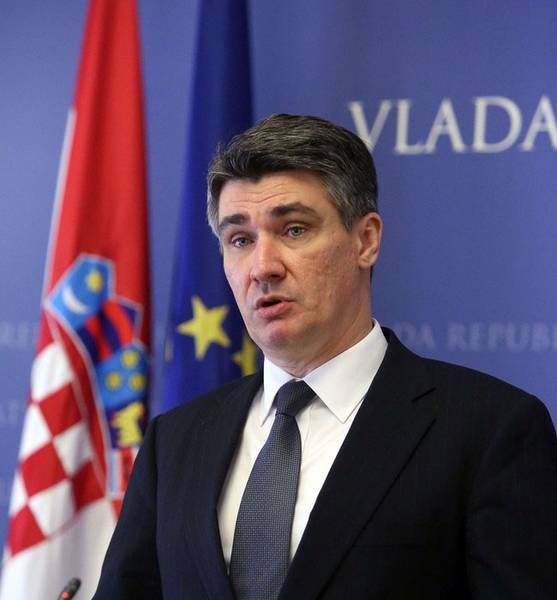Now EU Is Guilty for Croatia's Recession?
Adelina Marini, May 9, 2014
 You will often hear in Croatia comparisons with Greece and the determination of Prime Minister Zoran Milanovic not to let Croatia turn into a second Greece. But, this year, when economic growth is almost ubiquitous in the EU and even for Greece the European Commission forecasts a positive growth of 0.6%, the only two EU member states that will remain in recession are Croatia (-0.6%) and Cyprus (-4.8%). The Commission's spring forecast significantly deviates from the visions of the Croatian government. In its national programme [in Croatian] for reforms, the country foresees a stop of the recession and a real growth of the economy of 0.0%. In response to the Commission's pessimistic expectations, Deputy Prime Minister Branko Grcic, who is responsible for EU funds, said that if it were not for the European Commission's demand for reduction of the excessive budget deficit with more than 2% of the gross domestic product, Croatia would have this year come out of the recession.
You will often hear in Croatia comparisons with Greece and the determination of Prime Minister Zoran Milanovic not to let Croatia turn into a second Greece. But, this year, when economic growth is almost ubiquitous in the EU and even for Greece the European Commission forecasts a positive growth of 0.6%, the only two EU member states that will remain in recession are Croatia (-0.6%) and Cyprus (-4.8%). The Commission's spring forecast significantly deviates from the visions of the Croatian government. In its national programme [in Croatian] for reforms, the country foresees a stop of the recession and a real growth of the economy of 0.0%. In response to the Commission's pessimistic expectations, Deputy Prime Minister Branko Grcic, who is responsible for EU funds, said that if it were not for the European Commission's demand for reduction of the excessive budget deficit with more than 2% of the gross domestic product, Croatia would have this year come out of the recession.
This statement as well as the government's actions lately suggest that they have learnt about the excessive deficit procedure and about the European semester after July 1st, 2013, when the country joined the EU. However, there is no way this could be true because Croatia voluntarily agreed to take part in the European semester from the beginning of 2013, which means 6 months before its accession. Besides, since it signed its accession treaty, Croatian ministers and representatives participated as observers in the work of the Council and the European Parliament precisely at a time when all these issues were debated and some of them were even negotiated. That is the purpose of this observer status exercise.
Moreover, as part of its accession commitments, Croatia had to transpose by the end of 2013 the six-pack or the so called reform of the Union's economic governance which introduces the European semester and tougher measures for implementation of the Stability and Growth Pact. There is no way the government not to had known that the ceiling of the budget deficit is 3% of the gross domestic product and of the public debt 60%, furthermore against the backdrop of the fact that this government had a goal since the very beginning of its term to reduce spending and to put the headlong growth of the public debt under control. According to the European Commission's spring forecast, the government debt in 2013 was 67.1% which is a sharp rise compared to a year before when it was 55.9%. This year, too, an increase is expected to bring the debt up to 69% as the trend is the increase to maintain in 2015 as well, although with a slowdown - up to 69.2%.
Should the Commission not have demanded reduction of spending with the aim to crack down indebtedness, Croatia, for sure, would face a Greek scenario. Greece has the highest government debt in the EU, moreover after a haircut - 175.0% in 2013, 177% in 2014. With the speed with which the Croatian government is piling up debt it can come to the Greek scenario even in the framework of this government's term.
It is a fact that before EU membership Zoran Milanovic's government seemed a reformist one and even austerian. The search of a way to reduce the budget deficit, government debt and to increase revenues was a top priority of the cabinet and many things have been done. As it can be seen in the cabinet's report in the programme for reforms which Zagreb sends to Brussels, the fiscal discipline act has been amended, a special commission has been established to monitor fiscal discipline, cash registers have been introduced with the aim to reduce the share of the shadow economy and to increase revenues from the really high VAT - 25%. As of January this year, the preferential VAT rate has also been increased from 10% to 13% which affects certain goods and services.
Since last year, however, the government is acting in a rather chaotic way and with some panic. A revision of the budget takes place at least once a year. From time to time, various measures to boost growth or to limit spending are presented, as some of them are presented during urgently called news conferences. In the meantime, tensions have started to boil between the prime minister and the minster of finance which ended up with Slavko Linic's dismissal from government, but not before some serious shocks in the cabinet threatening to trigger a political crisis. Before leaving the cabinet, Mr Linic introduced a tax on lottery prizes, increased the health care contributions from 14% to 15%, transferred retirement contributions from the second to the first pillar and as of January 1st next year a tax on the interest of deposits is expected. A tax on real estate will also be introduced.
But still, the government does not succeed in bringing some order in the strategic state-owned companies which are a main source of pumping up of the government debt and, as a matter of fact, has become a reason for Slavko Linic's fall. The data of the Croatian government show that the overall indebtedness of the public enterprises is 81.9 billion kunas which is a little over 10 billion euros. With the aim to keep jobs, the already former finance minister introduced pre-bankruptcy agreements which allow for a restructuring of the debt of enterprises that have a potential for growth. As a result of the 2008 economic crisis, hundreds of companies ended up with no liquidity and high indebtedness. In the end of 2011, the accounts of 72 654 companies were blocked who employ more than 60 thousand workers. The purpose of pre-bankruptcy agreements is to release liquidity and keep jobs.
The reform of the public companies is one of the key ones in the national programme of reforms of the Croatian government. It also plans a reform of the pension system, the health care and the administration. Currently, 12.8% of pensioners retire after completing the maximum required length of service of 40 years. As a result of the crisis and the loss of jobs (the Croatian unemployment rate is now over 17% as the share of youth unemployment is the third largest after Greece and Spain), the ratio between those who pay social contributions and the pensioners dropped significantly to 1.15:1. At the moment, a process of levelling of the retirement age between men and women is going on which is expected to complete by 2030 at 65 years after which the retirement age will gradually increase by 2038 to 67 years.
In a process of establishment is also a new system for control of the issuance of invalidity pensions, which was one of the seven recommendations of the European Commission to Bulgaria. In the programme of the Croatian government it is said that the country has the biggest share of pensions for disabled people in the EU - in 2010 the costs for invalidity pensions was 3.24% of GDP and 29.6% of the overall spending on pensions, while the EU27 level was 1.1% of GDP or 9.73% of the spending for pensions. This huge difference can be explained with the fact that Croatia went through a severe war relatively recently - more than 20 years ago - which is why it is focusing its efforts now mainly on tackling frauds with pensions. Also foreseen is the establishment of a single money centre which will be the only administrative point which will handle the various social benefits, including pensions for disabled. Besides, a mandatory medical examination every three years has been introduced, as well as a possibility for ad hoc control examinations.
Also ongoing is a large-scale reform of the health care system which envisages restructuring of hospitals, reduction of hospital beds and modernisation. The current hospital system was built in Croatia  more than 50 years ago and is based on a different philosophy for provision of health care.
more than 50 years ago and is based on a different philosophy for provision of health care.
Currently, the biggest race in Croatia is on the basis of economic concepts. For now, the ruling coalition has a stable majority in Parliament, but the stability of the senior Social Democratic Party of Prime Minister Zoran Milanovic is under question. Croatian media believe that the dismissal of the most powerful minister in the government, who enjoyed an unusually high public rating, can lead to serious tensions in the party. The opposition has long been calling for early elections, but the biggest opposition party Croatian Democratic Union (HDZ), led by former internal minister Tomislav Karamarko, has managed for the first time to lead in the polls not because they got higher approval, but because the support for the Kukuriku coalition sharply dropped because of a series of corruption scandals, while Linic's dismissal is the drop that could have a significant impact on voters' attitudes three weeks before the European elections on May 25th.
In June, the European Commission will present its country-specific recommendations for the first time for Croatia. After their presentation, Zagreb will have to comply with them and to regularly report progress on their implementation. It will be harder and harder for the country to make excuses with Brussels for failures on national level. What can be said in "defence" of Croatia is that it is still in a process of adaptation to life in the EU - getting used to procedures, translating procedures in the Croatian context, bringing the European issues on the Croatian agenda. The country still is in a transition from pre-accession mode to actual membership which requires focusing less on domestic problems and getting the bigger EU picture. The government is still in the beginning of radical reforms in key sectors like the pension system, health care and state-owned enterprises in an environment of very strong and peremptory trade unions.
But still, the trend to throw the blame from the very beginning on Brussels for all the misfortunes piled for years before the accession is, to put it mildly, ill-mannered. This serves neither the government nor does it resolve the country's problems on behalf of the government. The EU is a legal framework and to some extent a single market. It depends on governments to take advantage of them and to fill it with content. Moreover, it is governments that create this legal framework. More wisdom and openness to the EU will only help Croatia and the government in particular.
 Kolinda Grabar-Kitarovic | © KGK
Kolinda Grabar-Kitarovic | © KGK Jozo Rados | © European Parliament
Jozo Rados | © European Parliament Aleksandar Vucic, Andrej Plenkovic | © Vlada RH
Aleksandar Vucic, Andrej Plenkovic | © Vlada RH